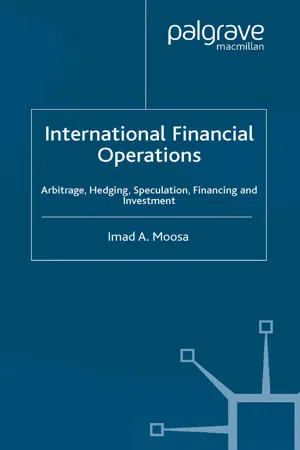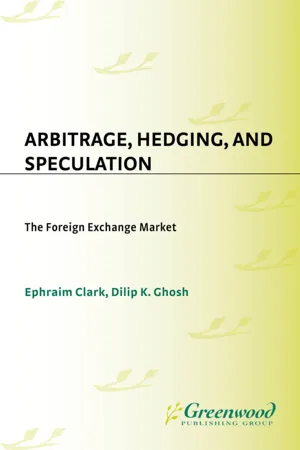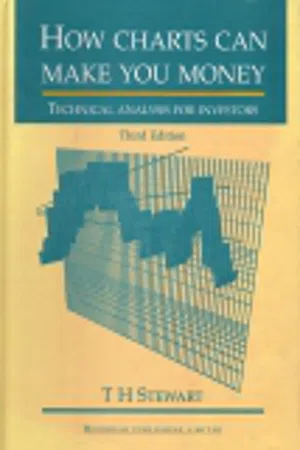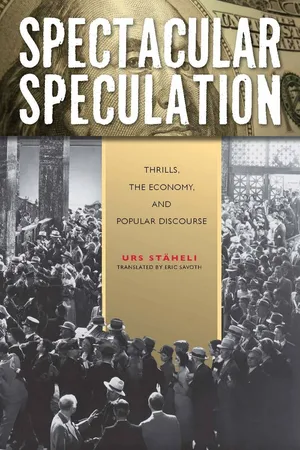Business
Speculation
Speculation refers to the act of engaging in risky financial transactions in the hope of making significant profits. It involves making bets on the future price movements of assets, such as stocks, commodities, or currencies, without necessarily having a full understanding of the underlying fundamentals. Speculation can lead to substantial gains but also carries a high level of risk.
Written by Perlego with AI-assistance
Related key terms
1 of 5
4 Key excerpts on "Speculation"
- eBook - PDF
International Financial Operations
Arbitrage, Hedging, Speculation, Financing and Investment
- I. Moosa(Author)
- 2003(Publication Date)
- Palgrave Macmillan(Publisher)
CHAPTER 7 Speculation in the Spot and Currency Derivative Markets 7.1 DEFINITION OF Speculation Speculation in the foreign exchange market is a subject that has been dealt with in the early writings on exchange rate economics. Early contributors to the post-war literature on exchange rate economics were to a large extent concerned with the role of Speculation in the foreign exchange market. Nurkse (1945) warned against the dangers of “bandwagon effect” as a source of market instability. In his seminal work on the choice between fixed and flex- ible exchange rates, Friedman (1953) argued for flexible exchange rates by suggesting that Speculation would be stabilising under flexible exchange rates because profit-making requires buying low and selling high, which is the action that makes Speculation stabilising. A proof of this proposition will be presented later. Tirole (1993) argues that the concept of Speculation has always fascinated academics and practitioners alike, attributing this fascination to “inconsistent definitions, occasional misunderstanding and genuine economic importance”. Speculation may be defined as the assumption of risk for the sake of making profit. Speculators act on the basis of certain beliefs or expectations, making profit if their expectations are realised (or if their forecasts turn out to be accu- rate). Another definition that can be found in the Oxford Universal Dictionary is that it is “the action or practice of buying and selling goods, stocks and shares, etc. in order to profit by the rise or fall in the market value, as distinct from regular trading or investment”. Keynes (1930) and Hicks (1939) viewed Speculation as a substitute for missing insurance markets, in that gains from trading are linked to differences in the trader’s willingness to take risk on an initial position. This is the so-called insurance motive for Speculation, whereby Speculation is viewed to be used to shift price risk from more to less risk-averse traders. - eBook - PDF
Arbitrage, Hedging, and Speculation
The Foreign Exchange Market
- Ephraim Clark, Dilip K. Ghosh(Authors)
- 2004(Publication Date)
- Praeger(Publisher)
In this chapter, we attempt to explain the 186 Arbitrage, Hedging, and Speculation rational behavior of an economic agent, who chooses to assume risk in his investment strategies. Risk refers to an investor entering or plunging into uncertainty and unknown variables in the decision-making process in the expectation of generating positive rates of return. We confine our discus- sions here within the scope of operations in spot and forward markets in currency trading. It is generally believed that in a financial world, the higher the risk one assumes, the higher the return one should expect in exchange. It is this general belief that drives an investor—individual or institution—into a choice of an investment menu with calculated risks. Empirical evidence often shows that an investor indeed does really well on the average in terms of returns by risky investment designs. We try to bring out the core of such risky investment, which is called++++++++++Speculation, as+ already noted, is the act of assuming a calculated risk in expectation of higher rates of return on the invested amounts. The existing literature is replete with research pieces on Speculation. Various aspects of this eco- nomic activity have been examined by the studies of Friedman (1953), Tsiang (1959), Grubel (1966), Kenen (1965), Spraos (1959), Neihans (1984), Feldstein (1968), Kohlhagen (1979), McKinnon (1979), and Wihlborg (1978), Ghosh (1997a, 1997b, 1998), and Ghosh and Arize (1993). Here, we plan to examine and explore the situations involving Speculation for a rational investor in the currency markets. To do so, we first assume that the investor faces no transaction costs in his financial operations in the market. Later, we will move away from the assumption of no transaction costs in the calculation of rational Speculation and profit measurement. INVESTMENT STRATEGY WITH RISK Forward Speculation and Spot Speculation without Transaction Costs Consider the following data collected by an investor. - eBook - PDF
How Charts Can Make You Money
An Investor's Guide to Technical Analysis
- T H Stewart(Author)
- 1996(Publication Date)
- Woodhead Publishing(Publisher)
Part Four Speculation I am tempted to say don't speculate, and leave it at that - but of course something like 95% of the readers are as interested in the subject as I am, so I would add; if you must, be careful and don't just plunge. How does one define Speculation? At the time of writing currency Speculation is the subject of attention; in 1979/80, it was gold and silver. It has also been coffee, property or ordinary shares at various times. I would define Speculation as buying, not for a stream of income and a hoped for rise in price too over the long term because the asset was bought cheap, but as a purchase made with a view to selling at a higher price irrespective of income. An example is an Italian friend who bought up a large quantity of pre-World War II Estonian bonds because there were few of them in circulation, and all in default, and the only asset was a massive embassy in Belgrave Square, the most fashionable part of London. He bought them in the 1950s and 1960s as non-performing Communist bonds in a non-existent state. Regrettably, he died before the property boom coincided with Estonia becoming independent again and needing more cash. Paying off old debts was a good way to establish financial credibility. Buying busted bonds may be long term, but it is just as much Speculation as my betting that X will win the Cheltenham Gold Cup, or that cocoa or the dollar will go up or down. The most common Speculations, however, are defined by two characteristics; they are short term and you can gear yourself up. Where Schlesinger is right in referring to speculators as 'investors and fund managers' is, for example, in the case of demanding a premium on investing in French as opposed to German bonds. - eBook - ePub
Spectacular Speculation
Thrills, the Economy, and Popular Discourse
- Urs Stäheli, Eric Savoth(Authors)
- 2013(Publication Date)
- Stanford University Press(Publisher)
future of the economy. Temporally, Speculation became the global, democratic “eye of business” capable of recognizing future risks and opportunities. The focus on handling risk placed Speculation in a classical economic vocabulary. Speculation only worked with risks in order to reduce them, and thus to do a service to the rest of the economy. In this sense, Speculation constantly progressed toward its own end. By successfully reducing economic risks, Speculation threatened the basis of its own existence. While gambling was reproached for creating artificial risks for pure entertainment, Speculation was seen as undoing itself.Socially, Speculation was thus understood as a necessary supplement to the market . Of course, markets could also function without Speculation. However, only Speculation created a genuine market by eliminating gaps and deficiencies in the “normal” market. Speculation lubricated a market that was—at least according to self-descriptions of the economy—itself already supposed to be perfect. Speculation was transformed into an economic activity by the notion that it could perfect the market . Communication by means of speculative prices was certainly self-referential and abstract, but it was wondrously connected to the rest of the economy. By contrast, gambling had broken away from, and become indifferent to, economic laws.2. Strategies of Exclusion and InclusionThe discourse of functionalization was accompanied by strategies of inclusion and exclusion that adapted to the discourse of functionalization, but that also followed their own logic. This dynamic has been implied several times. As we have seen, Justice Holmes famously defined Speculation as the self-adjustment to the probable of society, a process personified in “competent men” (Dies 1925, 20). Competence prevented the speculator from being allured by the spectacle of pure contingency. Speculation not only had to assume an economic function, but the seriousness of the speculator had to be guaranteed. Only in this way could the speculator rise to the higher function of market supplement. Inclusion and exclusion were meant to combine a form of functional differentiation in the economy with an adequate mode of inclusion. This proved hard to achieve, since the mass of future speculators in no way met the theoretical ideal of the knowledgeable speculator.
Index pages curate the most relevant extracts from our library of academic textbooks. They’ve been created using an in-house natural language model (NLM), each adding context and meaning to key research topics.



